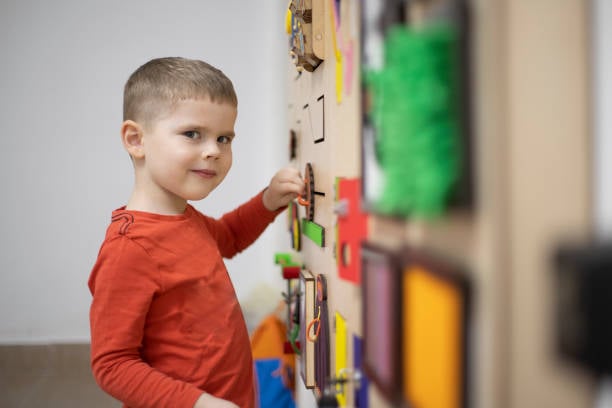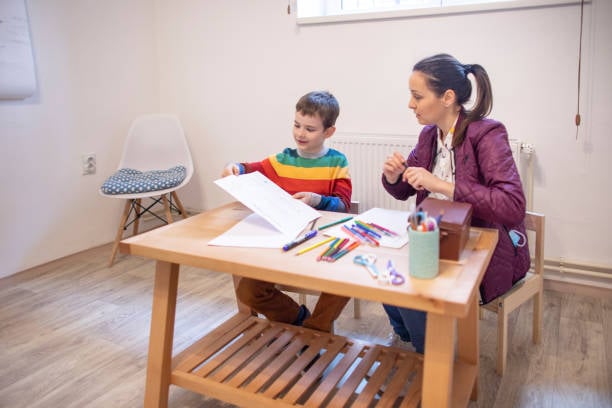
Communication and Autism
“There are 700,000 autistic people in the UK”. However, a recent study by The Lancet, in 2023, suggests this figure is substantially higher. There is also a growing belief that
SENsational Tutors understand that every person on the autism spectrum is different. That’s why the tutors can work holistically to provide tailored sessions to enhance many areas of your child’s development including: academics, communication and language needs, social skills, study skills and behavioural needs. They are able to adapt to your child’s individual learning styles so that your child can access learning and progress fully in many areas of their development.
The number of people on the autistic spectrum is much more common than many people think. In the UK, there are around 700,000 people – around one person per 100 in the population. Experts also suggest over a third of those with a learning disability may also be autistic. It’s worth noting, however, that learning disability should not be confused with learning difficulties. Learning disability refers to some degree of intellect, while a learning difficulty – such as dyslexia – is not tied to intellect
Joanna Gibbs, director of SENsational Tutors, spoke with world-renowned autism expert Tony Attwood to reveal the importance of being both understanding and creative when working with children and young adults with autism. She discussed how specialist tutors use special interests during the tutoring sessions.
In response to the SEN tutors incorporating children’s hobbies and special interests into the sessions, Tony
mentioned that he thinks that it’s:
“Brilliant! Because what you’ve got is motivation and conceptualisation. You have a concept, confidence, they enjoy it, it’s the key. Absolutely.”
Tony Atwood, Autism expert
"I used SENsational Tutors to source a suitable tutor for my autistic child who struggles with a lot of things. [Our tutor] has been very understanding and shifted her practices to fit with my daughter's very specific needs. We do the sessions online which means we each maximise our time, and it helps relieve the pressure too. I would highly recommend SENsational tutors to everyone who is interested in tutors for their Autistic kids. "
Beth, F’s mother, London


The more you understand autism, the better equipped you are to understand the diagnosis. It will help you make decisions about your child. There is a number of fantastic websites on autism available, including the National Autism Society and Autism Speaks.
Become an expert on your child and how autism affects them in their own distinctive way. Get to know their triggers, sensitivities and challenges. Learn what helps them when they face these obstacles. Be aware that there will be some trial and error – and what might work one day, may not work the next. But children with autism often display patterns in their behaviour, and the more you get to know these patterns, the more you will know how to help them in different situations
Build a partnership with your child, the school and any other professionals that support your child. Work together to discuss options, discuss and devise practical support plans, and make decisions that draw on good input from others.
Let home be a place where your child can be completely themselves. A place they do not have to worry about following social protocols. Be aware that precisely because this is the place they can be most relaxed and their way of being natural, they may have more meltdowns or moments of really challenging behaviour. There is no single way to try and deal with this, but as you get to know your child, you will know what helps them best. But don’t be afraid to ask for advice from professionals that work with your child to create a plan for if and when these situations arise.
Understand and accept that there will be ups and downs! There will be progress on some days, and setbacks on others. They are not the fault of either your child or you. Just be patient – making any situation better can take time. But also celebrate the positives, no matter how big or how small. Let your child know how proud you are of them, and that you are always there to help them.
Many hugely influential high- achievers past and present have either been diagnosed with Autism or exhibited clear signs that suggest they may be on the spectrum. They include science and tech wizards such as Bill Gates, Isaac Newton and Albert Einstein, musical geniuses like Beethoven and Mozart, plus wonderfully idiosyncratic film director Tim Burton.
"I have been using one of the tutors provided by SENsational Tutors for about 6 months now and I have been so pleased with the service. My ASD son has adjusted so well to his one-to-one tutor that he looks forward to him coming weekly. This service is worth every penny!"
Sia, M’s mother, London

Steve is an ASD specialist qualified teacher who is working towards gaining his National Award for SENCo qualification. He works with a particular focus on secondary-aged students and preparation for adulthood. Steve mentions that:
“I am very lucky to do a combination of 1:1 tutoring, project work with schools and developing accessible methods for intervention work. I find the most crucial element of my work is to get a deep understanding of what a family are looking for in tutoring and to identify the challenges that need prioritisation. It is then often the case of supporting that child to use their various strengths to make progress and get a sense of feeling successful again. I love those moments of connection and witnessing the empowerment that the right support can help achieve.”
Nicole is a qualified SEN tutor, Head of an Autism service and a SEND Governor. She has over 20 years’ experience working with a wide range of children on the autism spectrum, predominantly based in a large, all-age special school. She has experience working with children across the ability range including those with co-existing diagnoses of ADHD, Down Syndrome or demand-avoidant profiles. More recently, she has tutoring children who are out of school due to school-based anxiety or are at risk of exclusion, often linked to not being able to cope in the school environment.
What does Nicole consider when working with children with autism?

“When I’m working with children with autism, I’m constantly asking myself two important questions:
How does Nicole help children to become more regulated?
Children with autism can easily become dysregulated, especially with the social, sensory and cognitive demands of both home and school. So, our role as adults is to support the child to be well-regulated by:
How does Nicole help children to access learning? The use of visuals:
Turning to visuals, advice suggests they are often easier to process and a common strength for children with autism. This is why I’m always asking myself:
There are so many creative ways to make things more visual, from having a stock of pre-printed laminated cards, saving ‘to-do lists’ on a mobile phone app, to writing on the back of an old receipt while out and about.
What other advice to support children with autism?
Finally, I’ve also been really impacted by Gina Davies’ training on the Attention Autism program, where she talks about ‘offering an irresistible invitation to learn’. I’ve found that offering activities that are highly visual and intriguing, grab the child’s curiosity and they can’t resist joining in with learning. After all, isn’t what we all want to see for our children?

“There are 700,000 autistic people in the UK”. However, a recent study by The Lancet, in 2023, suggests this figure is substantially higher. There is also a growing belief that

It is estimated that approximately 80% of people who have autism will also experience burnout. Autistic burnout occurs when a person with autism can no longer cope with the pressures

When we mask, we camouflage and present a different reality to the world. The neurotypical population may mask to ease their nerves on their first day at school or adapt

The pre-teen years, when a young person begins the transition from childhood to adolescence, are a difficult time for most children. This period coincides with many life changes such as

Although we often hear that autistic people struggle to find employment and a meaningful role in the world, Max Green is proof that it is possible to create a fulfilling

Nurturing – providing food, comfort, protection or support – is often associated with looking after pets or plants or bringing up children. Certainly, all children need kindness and care to
Showing our latest reviews
Subscribe for free to receive regular updates about how to help your child with SEN/SEND
SENsational private tutors specialise in assisting children with Autism, ADD/ADHD, Dyslexia and other Special Education Needs (SEN).


Mulit-award winning. Winner of the UK’s People’s Choice, Tuition Agency of the Year 2023 & 2024.